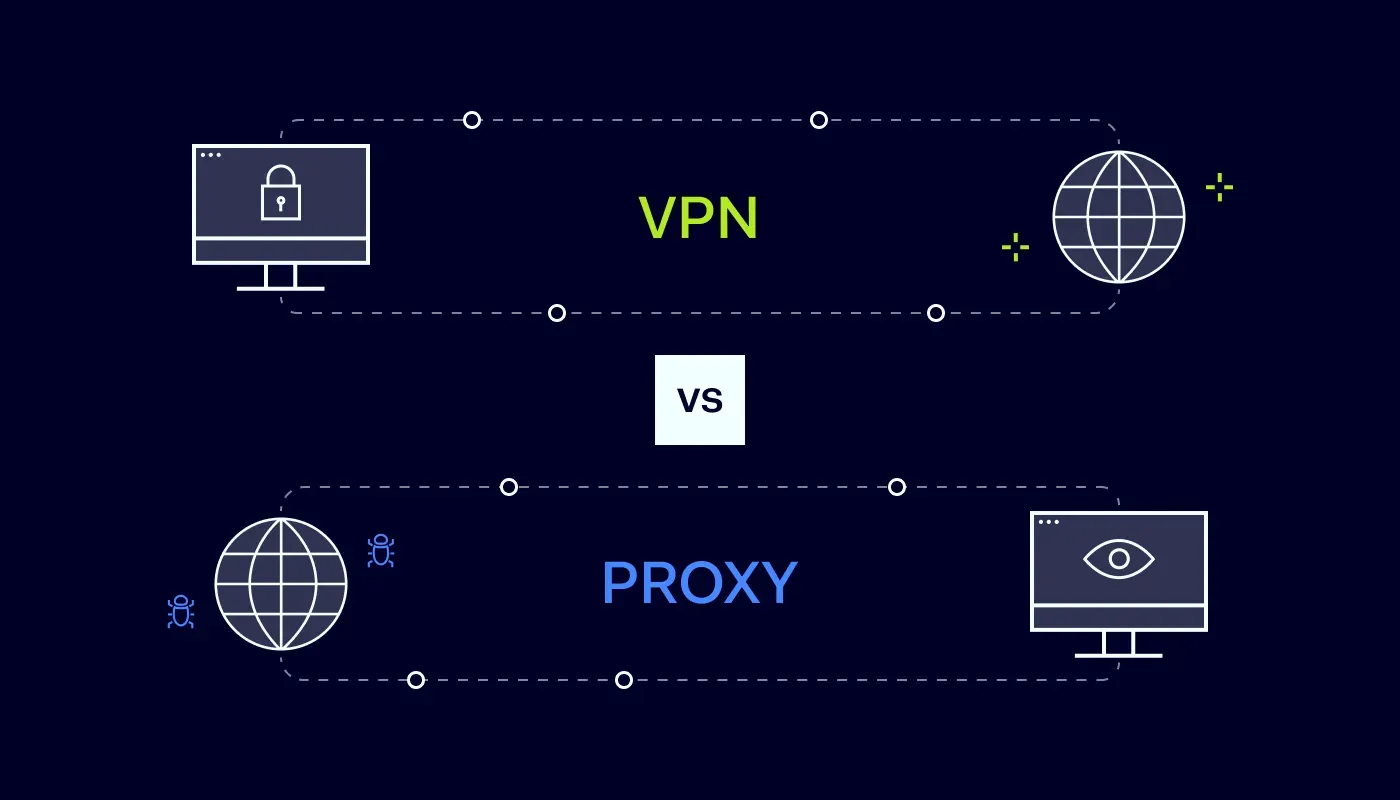In today’s digital landscape, protecting your online privacy, accessing geo-restricted content, and securing your internet connection are top priorities. Two common tools for achieving these goals are proxies and VPNs (Virtual Private Networks). While both serve similar purposes, they work differently and are suited for distinct use cases. This article explores the key differences between proxies and VPNs to help you decide which one is right for you.
What is a Proxy?
A proxy is an intermediary server that routes your internet traffic through its network before sending it to its final destination. By doing so, it masks your IP address and can modify your geographical location.
How Proxies Work
- You connect to a proxy server.
- The proxy forwards your request to the target website or service.
- The website sees the request as coming from the proxy server, not your device.
Types of Proxies
- HTTP Proxies: Designed for web traffic, ideal for accessing websites.
- SOCKS5 Proxies: More versatile, handling web traffic, gaming, and file sharing.
- Transparent Proxies: Provide no anonymity, often used by organizations for monitoring or filtering.
What is a VPN?
A VPN creates an encrypted tunnel between your device and a remote server, routing all your internet traffic through this tunnel. Like a proxy, it hides your IP address, but it also encrypts your data for added security.
How VPNs Work
- You connect to a VPN server.
- The VPN encrypts your data before sending it to the destination.
- The target website or service sees the request as coming from the VPN server.
Proxy vs. VPN: Key Differences
| Feature | Proxy | VPN |
| IP Masking | Yes | Yes |
| Data Encryption | No | Yes |
| Traffic Coverage | Limited to specific apps (e.g., browsers) | Covers all internet traffic on your device |
| Speed | Generally faster but less secure | Slightly slower due to encryption |
| Privacy | Basic anonymity; data can be intercepted | High-level privacy; data is encrypted |
| Cost | Often free or low-cost | Typically subscription-based |
| Ease of Use | Easy to configure for specific applications | Simple setup for device-wide protection |
| Bypassing Restrictions | Effective for basic restrictions | More effective for advanced geo-restrictions |
When to Use a Proxy
Proxies are best suited for tasks that require quick setup and basic anonymity.
Common Use Cases
- Accessing Geo-Restricted Content: Viewing region-specific websites or videos.
- Web Scraping: Gathering data from websites without exposing your IP.
- Bypassing Network Restrictions: Accessing websites blocked by local networks.
- Gaming: Reducing latency by connecting to servers closer to the game’s region.
Advantages
- Faster due to lack of encryption.
- Affordable, with many free options available.
- Easy to configure for specific apps or browsers.
Disadvantages
- No encryption, making data vulnerable to interception.
- Limited scope, only affecting specific applications.
When to Use a VPN
VPNs are ideal for users who prioritize security, privacy, and comprehensive protection.
Common Use Cases
- Secure Public Wi-Fi: Encrypting data while connected to public networks.
- Privacy Protection: Keeping online activities private from ISPs, hackers, and governments.
- Bypassing Censorship: Accessing restricted content in countries with strict internet regulations.
- Streaming Geo-Locked Content: Unlocking global content on platforms like Netflix or Hulu.
Advantages
- Encrypts all traffic for robust security.
- Protects all apps and services on your device.
- Reliable for bypassing sophisticated restrictions.
Disadvantages
- Slower speeds due to encryption overhead.
- Subscription costs for premium services.
Proxy vs. VPN: Which One Should You Choose?
Choose a Proxy If:
- You need a quick and inexpensive solution.
- Your primary goal is bypassing basic geo-restrictions.
- You only need protection for specific apps or browsers.
Choose a VPN If:
- You value privacy and data encryption.
- You frequently use public Wi-Fi or travel.
- You want device-wide protection.
Can You Use Both?
Yes, you can use a proxy and a VPN together for enhanced privacy and functionality. For instance, a VPN can encrypt your data while the proxy changes your IP address. However, this setup may require technical expertise and can result in slower speeds.
Popular Proxy Services
- Smartproxy: Great for web scraping and automation.
- ProxySite: Free web-based proxy for basic browsing.
- SOCKS5 Proxies: Provided by services like Private Internet Access (PIA).
Popular VPN Services
- ExpressVPN: Known for speed and robust security.
- NordVPN: Offers advanced features like Double VPN and CyberSec.
- Surfshark: Budget-friendly with unlimited device connections.
Conclusion
Both proxies and VPNs are valuable tools for enhancing online privacy and accessing restricted content. Proxies are lightweight and cost-effective for specific tasks, while VPNs offer comprehensive protection and advanced security. Evaluate your needs and choose the solution that best fits your requirements.
For ultimate security and flexibility, consider combining both tools, ensuring privacy without compromising functionality.
